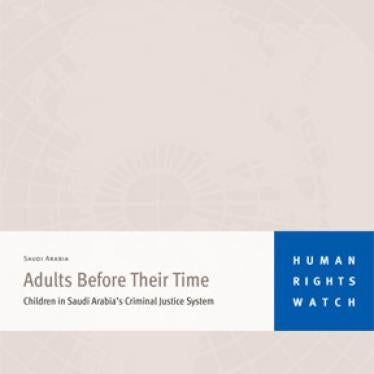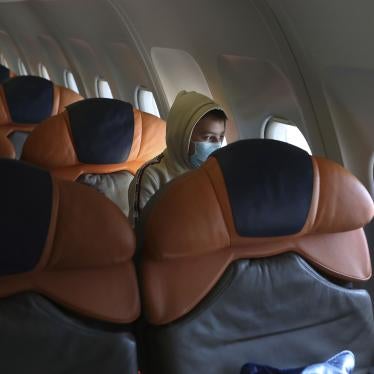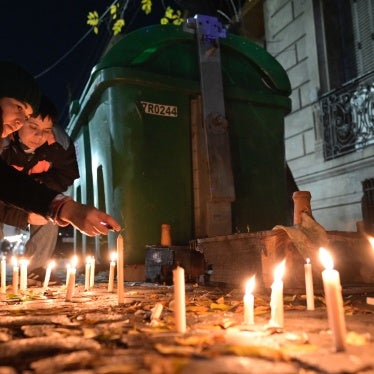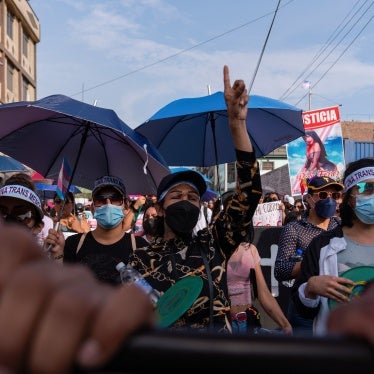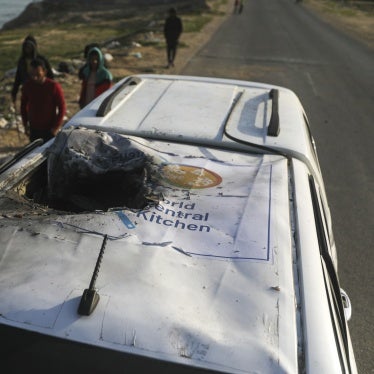By Christoph Wilcke, Researcher, Middle East and North Africa Division, and Clarisa Bencomo, Researcher, Children’s Rights Division, published in Progress Online
April 7, 2008
In Saudi Arabia’s special intelligence prisons between 1,500 and 2,000 men languish in jail for years on mere suspicion of wrongdoing, which can range from criticizing the ruling regime to material involvement in the Iraq insurgency.
Like their compatriots in Guantanamo, almost all of whom have been returned to Saudi Arabia, these Saudi security detainees have no recourse to trials to obtain their release or clear their name. Unlike Guantanamo inmates, however, they have no access to lawyers or the International Committee of the Red Cross. The Ministry of Interior alone decides their fate, whether to release or keep in custody even those who have completed the ‘re-education’ programme.
This programme, which the Saudis call ‘consultation committees’, involves security detainees undergoing classes with clerics and psychologists teaching a proper understanding of jihad and treatment of non-Muslims. It replaces a criminal trial or other legal proceedings. Graduating from this programme is a necessary, but not sufficient, condition for release.
The survey of intelligence prisons forms part of a year-long Human Rights Watch examination of the Saudi criminal justice system. In two separate reports released on 25 March, Human Rights Watch documents the profound deficiencies in Saudi Arabia’s criminal justice system that land persons in jail who have committed no discernible offence or whose guilt has not been appropriately established. We found pervasive and multiple abuses of the rights to due process and fair trial.
This kind of legal limbo applies to all Saudi prisoners. The Saudi authorities have also arrested activists like Professor Abdullah al-Hamid, Judge Sulaiman al-Rashudi, and blogger Fu’ad al-Farhan when they protested against the detention without trial of security detainees. In March, al-Hamid started a six-month jail sentence for encouraging a peaceful demonstration, and al-Rashudi has been detained without trial since 2 February 2007, the day before he planned to sue the Ministry of Interior. Farhan, who lobbied for the release of al-Rashudi and his associates, has been in solitary confinement since 10 December 2007 without charge or trial.
Because Saudi Arabia has no written penal code, prosecutors often don’t bother to charge defendants with a particular crime or cite vague charges such as ‘disobedience to the ruler’ or ‘mixing with the other sex’. As the cases of Abdullah al-Hamid and Fuad Farhan show, simply trying to exercise rights such as free speech can also lead straight to jail. Liberal reformers in particular suffer the consequences. The authorities did not arrest Shaikh Abd al-Rahman al-Barrak, a senior cleric, who issued a fatwa in March calling for the death of two liberal journalists.
The absence of a penal code also has grave consequences for children. Saudi justice officials told us that pre-teen children can be sentenced to death on murder charges as long as they exhibit physical signs of puberty – a rather subjective notion that takes no account of mental or emotional maturity. Last year, Saudi Arabia executed three people for crimes committed while younger than 18, including a 15-year-old boy who was only 13 at the time of his alleged crime.
The juvenile detention system houses boys as young as 12 and girls and women as old as 30. Detention centre staff can hold both indefinitely for ‘guidance’ - even if they have been found innocent or completed their sentence. Saudi officials routinely arrest and detain foreign children trafficked for begging, and often deport them to conflict zones like Somalia or Chad without tracing their families or ensuring that return is safe for the child.
An investigation into more than 60 criminal cases revealed that ordinary criminal defendants, including children, usually did not have access to legal counsel or other means to prepare their defence. Many only learned of their trial dates from their prison guards the night before. Statements extracted under torture were stamped with the defendant’s fingerprint, meaning they could not be challenged in court. Judges gave defendants only little time to speak, and often prohibited cross-examination of prosecution witnesses or the presentation of defence witnesses. Court documents record judges sentencing defendants while simultaneously expressing doubt as to their guilt.
Though Saudi officials pay lip service to the rule of law, this is difficult to reconcile with reality. Arbitrary arrests and unfair trials characterize the fate of those who enter the system.
Saudi Arabia must issue a written penal code that does not criminalize the exercise of human rights. Officials must become legally accountable. This means stopping trials or overturning verdicts where fundamental due process and fair trials have been violated. All juvenile, poor, and capital defendants should be afforded criminal defence lawyers free of charge as a matter of course.
